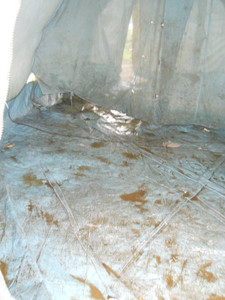The Convoy
- kwankew
- Aug 30, 2012
- 3 min read
Updated: Dec 23, 2020
Thursday mornings are for the convoy to take the DRC refugees to Rwamwanja resettlement camp, an eight-hour journey with a lunch stop at Mbarara. This morning there are only eight buses and one is not completely filled. A couple of UNHCR trucks with supplies of mats, tents, blankets and containers are parked at the transit center. Each refugee wears a yellow wrist band to show that they are bound for resettlement and they are given a mat and blanket as they board the bus. At the peak of the refugee registration, there were two convoys of twenty buses each leaving the transit camp for Rwamwanja twice a week so this morning's convoy seems small in comparison. The convoy is led by soldiers offering security and a security police sits next to the bus driver and bringing up the rear is Medical Teams International (MTI) ambulance. This morning the convoy is held up from its departure because it is missing a little boy. Later he is seen scampering hurriedly to his bus, whether he goes off to say his last good-byes to his friends is anybody's guess.
As the convoy with its four hundred and eighty souls rolls out slowly towards the east engulfing slowly by the cold morning mist, there seems to be a lingering sadness about the whole scene: the refugees are leaving all that is familiar; their home, friends, schools, and heading towards some unknown foreign land to set up a temporary life for themselves, all the while never knowing when they will ever be able to return to their homeland again.

A few weeks ago, one of the buses while negotiating one of the hair-pin loops over the mountains overturned killing two refugees, one of whom was a little boy who happened to stick his head out of the bus window. It is as though leaving one's homeland is not enough of a tragedy it itself, these refugees have to endure more unforeseen ones lurking in every corner.
The campsite is quiet again, a small number of newly arrivals stand in line to be registered, some have rolled-up mattresses next to them. Women refugees who are left behind sweep the floor of the tents with make-shift brooms of cut branches. Tent floors are wet with mud and water because of the daily afternoon downpours. The empty tents smell of sweats and remind one of barn animal stench in a farm. As the transit center only provides two meals a day, some lucky families cook their own breakfast of cornmeal and beans and huddle in front of the tent entrances sharing from a common bowl while others less fortunate ones have to go hungry.
Before the convoy leaves with the refugees who have been in the camp for a few days, the clinic is busy again with the arrival of many more new refugees. Children run wildly in the camp while there are many dangerous make-shift stove made from the lava rocks scattered all over the camp site. Women cook supplementary food for their families and it is not long before some little ones gets close to such open stoves and pots. The entrepreneurs of the locals of Kisoro came to the campsite setting up daily markets selling food and clothes to the refugees. Where there are people there is bound to be commerce.
This little girl was burned four days ago when she ran over a hot pot of porridge. The grandmother did her level best and applied "Colgate" over the burn. Again the same story is played here, she was abandoned by her young mother to the care of her grandmother two years ago so that the mother could live her life with another man.

Unfortunately my next patient with big swollen eyes heard cries emanating from my room made by a young boy who was petrified by "the Mazungu" even though I did not inflict any physical pain on him. Just the mere sight of me was enough to make him cry and he never dared set his eyes on me. So my wasp-stung boy cried heartily.

This young mother was worried about her baby's frequent urination. As I examined him he immediately sent a stream of urine all over the floor, narrowly missing my face. The lab did not detect any signs of infection and reassurance was given to the mother. It is not uncommon for many of these children to run barefoot here despite the cold weather and puddles galore, as a result cuts and sores are plentiful.
The clinic is essentially serving many nationals today after the convoy left as the newly-arrived refugees are still finding their bearings in the camp and learning about the available services. There is also a cervical cancer screening program in the clinic on Thursday run by the Kisoro District Hospital so the clinic is packed with many women.













Commentaires